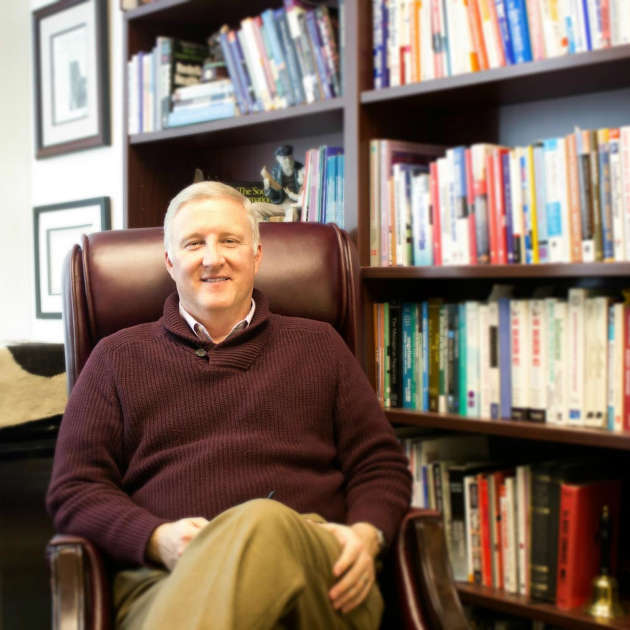Contents
- JSOM: How did you become interested in pursuing a healthcare leadership and management career?
- How did you transition from industry to academia?
- Let’s talk about the Center for Healthcare Leadership and Management. What kind of value is it going to add to the world?
- What’s the biggest challenge in healthcare right now?
- Now, what you’ve already said, I’m sure, is going to excite a lot of students who are considering a career in healthcare management. What advice would you give them?
- Why is the healthcare industry changing so rapidly?
- So let’s pivot a little bit and talk about you. What do you like to do in your spare time?
- What else do we need to know about you?

Healthcare is a leading topic in today’s world. With a Bachelor of Science in Healthcare Management, the degree focuses on preparing students for leadership positions in the healthcare industry. The healthcare management degree program helps you gain the skills you need to become an effective manager of health systems and operations. We’re here with Dr.Britt Berrett, Ph.D., Clinical Professor and Director of the B.S. in Healthcare Management program to answer a few questions about his background and outlook in the industry.
JSOM: How did you become interested in pursuing a healthcare leadership and management career?
Berrett: I had some life experiences related to health. I was seriously burned in an explosion when I was a kid, and I watched the men and women that cared for me — and did so in such an orchestrated fashion — it was inspiring. Later on, I served an LDS mission, a Mormon mission, in Peru, and I saw healthcare in a developing country, and it was shocking, was startling; it was sobering — and I thought, “Is this the measure of a community?”
So, from those experiences, I decided I would be part of the healthcare delivery system. I wanted to find purpose, and I wanted to find meaning in what I did professionally.
How did you transition from industry to academia?
Oh, it’s been a wonderful transition. I had a great experience leading wonderful organizations — 20 years as a hospital president, 25 in the industry — but I knew that I wanted to prepare the next generation of healthcare leaders. I asked the fundamental question, “How do we change healthcare? How do we do that?” And that’s to prepare the young men and young women, and I felt that, with my experience, I could add some value to their preparation.
Let’s talk about the Center for Healthcare Leadership and Management. What kind of value is it going to add to the world?
That’s a good question. We received approval from the [UT System] regents to create the undergraduate program here at The University of Texas at Dallas and, with that, it filled out a portfolio of educational offerings. We already have a graduate program, a Master of Science in Healthcare Leadership and Management. That’s for graduate students who are entering executive roles — already in place, been here 10 years. We also have a program that is for physicians — led by some very talented and capable faculty and adjuncts that train the next generation of physician leaders. We also have a program that’s a graduate program for students that are in the work field.
We have all these offerings, and with the undergraduate [program] approved in 2015, we brought these all together and have created the Center for Healthcare Leadership and Management. And I am proud to be the director of that. What we’re doing is orchestrating educational offerings for the whole continuum. We have lectures. We have panels. We have guest lecturers. We have site visits. We have case-study competitions — from all those areas that speak to some of the healthcare management challenges.
What’s the biggest challenge in healthcare right now?
I think to orchestrate such a complicated and really confusing industry. It’s $3 trillion and growing. It’s 17 percent of the GDP (gross domestic product). Seven of the 10 fastest-growing professions are in healthcare. Now I would assert … that we don’t have an issue with the clinical side. We’re doing amazing things. We’re curing cancer. We’re devising and creating medical possibilities. But how do you take it from the bench to the bedside? How do you do that? How do you speak to the issue of appropriate access? How do you measure quality? These are fundamentally business processes that we could integrate with the healthcare-delivery system to the benefit of all. So, those are some of the challenges I think we have in healthcare.
Now, what you’ve already said, I’m sure, is going to excite a lot of students who are considering a career in healthcare management. What advice would you give them?
One of the great benefits of UT Dallas is its reputation. The students are known to be very, very bright, very, very capable, very serious students. So, great reputation. The Jindal School of Management — nationally recognized for business acumen — that’s a great partnership. And then you sit in one of the fastest-growing metroplexes in the United States —DFW. More than 7 million people and millions of possibilities for students that get their undergraduate and graduate to go out and pick an area of interest. They might want to work in hospitals. They might want to work in physician clinics. They might want to be in the medical-device area. They might want to do consulting. They might want to look at pharmaceutical development and manufacturing. I mean — all these things are available in the DFW — so strong educational experience, faculty that is academics and researchers and practitioners — professionals coming out of the industry to help — and then I think a tremendous opportunity in this geography.
Why is the healthcare industry changing so rapidly?
There are a couple of influences. Our demographics are changing. The baby boomers are getting older. Every day 10,000 people turn 65. That’s a big demographic. We have a changing demographic with diversity — which is exciting. It’s new, it’s exciting. But with it comes some healthcare issues. Let’s admit that we are not a nation focused on health and wellness. We look at medical care — so we’ve got to figure out how we improve the health and wellness of individuals. And then the last factor that I think has been political in nature … undeniably, the creation of the Affordable Care Act — Obamacare — which threw the insurance industry up in the air. And now we have declared that healthcare in more than a privilege, it’s a right. And so we’re going to have to orchestrate limited resources to respond to that, and, with the new presidency, I’m of the opinion that it’ll be dynamic. It’ll be exciting. It’ll be rewarding, and we need well-prepared healthcare leaders —and that’s what we’re here to do.
So let’s pivot a little bit and talk about you. What do you like to do in your spare time?
I love my family, and that’s my priority — my faith and my family — and I’m very involved in both. I just became a grandfather so I do have 1,200 pictures of my grandson. I’m delighted to show anyone those pictures. So that’s an important part of my life. And, I will admit, I love to go Jeeping. So, I’ve got a couple of Jeeps, and we go four-wheeling. That’s my indulgence.
What else do we need to know about you?
I think the passion that I bring to the industry and to the students. I just feel this overwhelming calling in life to prepare the next generation. I was raised in Canada. I saw the healthcare-delivery system in a socialized medicine environment. I lived several years as a Mormon LDS missionary in Peru, and I saw healthcare in a third-world country — and then I look at the good, the bad and the ugly, and I recognize that there are solutions to be had.
I’m inspired by this next generation. I really am. They’re bright. They’re engaged, and they’re passionate. They want to find purpose. They want to do something more — and that, to me, is very rewarding… And we have a number of lecturers come to the campus, and they love it, and they engage, and they participate. And I offer that to any practitioner: Come to the campus. Get involved. Share your thoughts. Be part of a panel. Prepare this next generation because they will be the solution.





